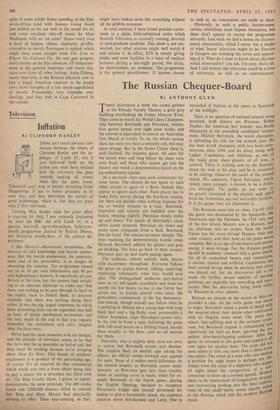The Russian Chequer-Board
By ANTHONY GLYN
THREE. afternoons a week the crowd gathers at the Estrada Variety Theatre, a grim grey building overlooking the frozen Moscow River. They come to watch the World Chess Champion- ship between Botvinnik and Petrosian, twenty- four games spread over eight tense weeks; and the interest is equivalent to ours in an Australian Test Match at Lord's. To us, for whom serious chess has only ever been a minority cult, this may seem strange. But in the Soviet Union chess is, with football, the majority game. All seats for the match were sold long before the dates were even fixed, and those who cannot get into the theatre can watch a demonstration board on the icy embankment outside.
As a spectacle chess may seem undramatic for some tastes. The players do not speak to each other, except to agree to a draw. Indeed, they appear to ignore each other. Each player has to make forty moves during the five-hour session, but there are periods when nothing happens for ten or twenty minutes at a time. Botvinnik, impassive and solemn, sits huddled over the board, swaying slightly. Petrosian slowly stalks up and down. The hands of Botvinnik's clock move slowly onwards. Petrosian sits down and pours some orangeade from a flask. Botvinnik lifts his hand. The tension increases sharply. The boys manning the demonstration boards creep forward. Botvinnik adjusts his glasses and goes on thinking. The boys go back to their corners. Petrosian gets up and starts pacing again.
The audience, almost entirely male, buzzes with excitement throughout. Everyone follows the game on pocket boards, talking, analysing, explaining vehemently what they would now play. The distinguished unshaven grey-haired man on my left speaks ceaselessly and none too quietly for five hours, to me, to the Tartar boy across me, to friends several rows away. He gesticulates continuously at the big demonstra- tion boards, though nobody can follow what he is pointing at. Behind me a young man with long black hair and a big fleshy nose, presumably a fellow Armenian, claps Petrosian's moves only. In the row in front a man, following the game with full-sized pieces on a folding board, knocks them steadily to the floor, and we all burrow for them.
Petrosian, who is slightly deaf, does not seem to notice, but Botvinnik scowls and shushes. The umpires flash an electric sign asking for silence, an official comes forward and appeals for quiet. None of it makes much difference. As the tension mounts, as Botvinnik comes under pressure, as Petrosian gets into time trouble, when an exciting move is made, when for ex- ample Botvinnik in the fourth game, playing the English Opening, declined to recapture Petrosian's knight and instead developed his bishop to give a formidable attack, the audience reaction seems hot-blooded and Latin. One is reminded of Italians at the opera or Spaniards at the bullfight.
There is no question of national interest being involved; both players are Russians. Bobby Fischer, the American boy wonder, was finally eliminated in the preceding candidates' tourna- ment. Mikhail Botvinnik, the world champion, is defending his title for the seventh time. He has been world champion, with two brief inter- missions, since 1948, and his place, along with Lasker, Capablanca and Alekhine, as one of the really great chess players of all time, is assured. There is nothing new, to the Russians about the man or his play, and he is rumoured to be retiring, whatever the result of the present match. His opponent, Tigran Petrosian, nearly twenty years younger, is known to be a defen- sive strategist. The public do not seem to be greatly interested in the players, and, apart from the Armenians, are not noticeably partisan. It is the games they are interested in.
The Russians came late to chess. Up till 1921 the game was dominated by the Spaniards, the Americans and the Germans. In 1914 only one of the five Grand Masters was a Russian, and he, Alekhine, was an émigré. Now the Soviet Union has far more Grand Masters than anY other country, and their hold on the game seems complete. But in an age of astronauts and atomic energy it seem strange that the Russian people should be suddenly obsessed with a game which, for all its undoubted beauty and compulsion, is ancient, limited and artificial. Capablanca has been proved wrong when he declared that chess was played out, but the discoveries still to be made, the further, deeper analysis of opening positions, are arguably less rewarding and spec- tacular than the discoveries being made today by Russians in other spheres. Itro_ e" patient, slow-handclapping audience. After Perhaps an episode at the match in Moscow provides a clue. As the sixth game was about . to begin, Botvinnik raised a point of detail with the umpires about their duties when confronted f with an illegible score sheet. The point ter was minor, hair-splitting and at the moment irrele repetitively for half an hour, ignoring the vant, but Botvinnik argued it exhaustively and game, he returned to the point and argued it1! over again for another hour. The point didmonvs0:t seem minor to him, any more than a chess was minor. The mind of a man who can analdYis_ a position for eight hours is perhaps not similar from the mind of a diplomat whoaargsuubes_ all night about the composition of
committee to draw up a revised agenda. Modern chess, in its requirement of imaginatiori, ismtrpaitiecgY a- and unwearying probing into the final seems exactly suiterl__ tions of one small move,
to the Russian mind and the modern mood. ibis I"


































 Previous page
Previous page